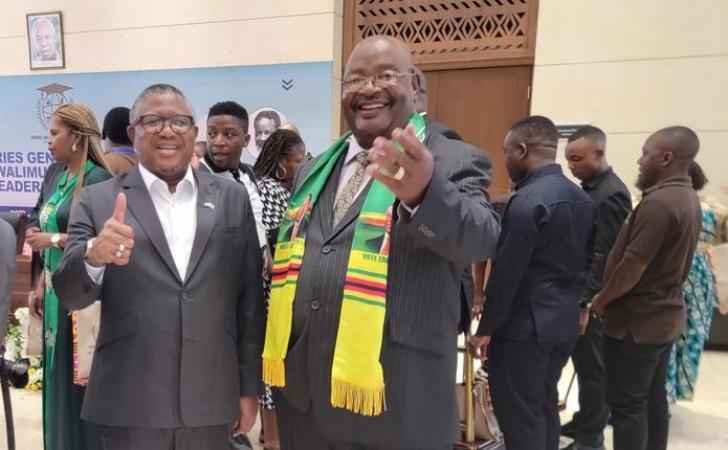News / National
Southern African liberation movement face crisis
12 hrs ago | Views

Leaders of former liberation movements from Southern Africa, including Zimbabwe's ruling Zanu PF, have convened in Johannesburg for a crucial three-day summit aimed at addressing the existential crisis confronting their political parties.
The summit, held under the theme "Defending the Liberation Gains, Advancing Integrated Socio-Economic Development, Strengthening Solidarity for a Better Africa," brings together six historic ruling movements that played leading roles in the region's liberation struggles.
This meeting comes at a critical time as many of these parties face mounting challenges. Some struggle to maintain political relevance amid growing pressure to reform or risk losing power, others are shaken internally, while a few have already been unseated and consigned to political obscurity.
Recent electoral upsets have sent shockwaves across Southern Africa. The Botswana Democratic Party, which ruled for 58 years, was defeated in November 2024. Significant opposition victories in Zambia, Seychelles, Lesotho, and Mauritius, coupled with strong opposition performances in Zimbabwe's 2023 elections, have heightened concerns among former liberation parties about their future viability.
Zimbabwe's Zanu PF, which narrowly escaped losing power after the 2008 parliamentary elections, now faces renewed scrutiny. Meanwhile, South Africa's African National Congress (ANC), chaired by summit host President Cyril Ramaphosa, saw its vote share plunge from 57% to 40% in last year's elections, intensifying calls for reform within the party.
President Ramaphosa welcomed leaders and delegations from across the region, urging them to deeply reflect on the major political developments and seismic shifts they face. The goal is to find collective solutions that can halt the decline and potential demise of these once-dominant liberation-era parties.
Zimbabwean President Emmerson Mnangagwa is attending as the leader of Zanu PF, with a focus on promoting economic development and strengthening regional cooperation. Namibia's Swapo, led by President Netumbo Nandi-Ndaitwah, aims to bolster regional ties and tackle shared socio-economic challenges. Angola's MPLA, represented by President Joao Lourenço, seeks to advance economic integration and Pan-African solidarity. Mozambique's Frelimo, under the younger leadership of President Daniel Chapo, who was not part of the original liberation struggle, plans to explore ways to enhance regional cooperation and development. Tanzania's Chama Cha Mapinduzi (CCM), represented in the possible absence of President Samia Suluhu, emphasizes the preservation of liberation values and greater youth engagement.
Throughout the summit, delegates are expected to deliberate on how to defend the hard-won liberation gains and promote governance that is centered on the people's needs. They will also focus on advancing socio-economic development by fostering deeper economic integration and cooperation within Southern Africa. Furthermore, the leaders aim to strengthen solidarity across the region, working together to confront common challenges and build a more united and prosperous Africa.
This summit marks a significant moment for these former liberation movements to take stock of their legacies, confront present-day political and economic challenges, and chart a strategic path forward for the future of the region.
The summit, held under the theme "Defending the Liberation Gains, Advancing Integrated Socio-Economic Development, Strengthening Solidarity for a Better Africa," brings together six historic ruling movements that played leading roles in the region's liberation struggles.
This meeting comes at a critical time as many of these parties face mounting challenges. Some struggle to maintain political relevance amid growing pressure to reform or risk losing power, others are shaken internally, while a few have already been unseated and consigned to political obscurity.
Recent electoral upsets have sent shockwaves across Southern Africa. The Botswana Democratic Party, which ruled for 58 years, was defeated in November 2024. Significant opposition victories in Zambia, Seychelles, Lesotho, and Mauritius, coupled with strong opposition performances in Zimbabwe's 2023 elections, have heightened concerns among former liberation parties about their future viability.
President Ramaphosa welcomed leaders and delegations from across the region, urging them to deeply reflect on the major political developments and seismic shifts they face. The goal is to find collective solutions that can halt the decline and potential demise of these once-dominant liberation-era parties.
Zimbabwean President Emmerson Mnangagwa is attending as the leader of Zanu PF, with a focus on promoting economic development and strengthening regional cooperation. Namibia's Swapo, led by President Netumbo Nandi-Ndaitwah, aims to bolster regional ties and tackle shared socio-economic challenges. Angola's MPLA, represented by President Joao Lourenço, seeks to advance economic integration and Pan-African solidarity. Mozambique's Frelimo, under the younger leadership of President Daniel Chapo, who was not part of the original liberation struggle, plans to explore ways to enhance regional cooperation and development. Tanzania's Chama Cha Mapinduzi (CCM), represented in the possible absence of President Samia Suluhu, emphasizes the preservation of liberation values and greater youth engagement.
Throughout the summit, delegates are expected to deliberate on how to defend the hard-won liberation gains and promote governance that is centered on the people's needs. They will also focus on advancing socio-economic development by fostering deeper economic integration and cooperation within Southern Africa. Furthermore, the leaders aim to strengthen solidarity across the region, working together to confront common challenges and build a more united and prosperous Africa.
This summit marks a significant moment for these former liberation movements to take stock of their legacies, confront present-day political and economic challenges, and chart a strategic path forward for the future of the region.
Source - byo24news














.jpg)



























